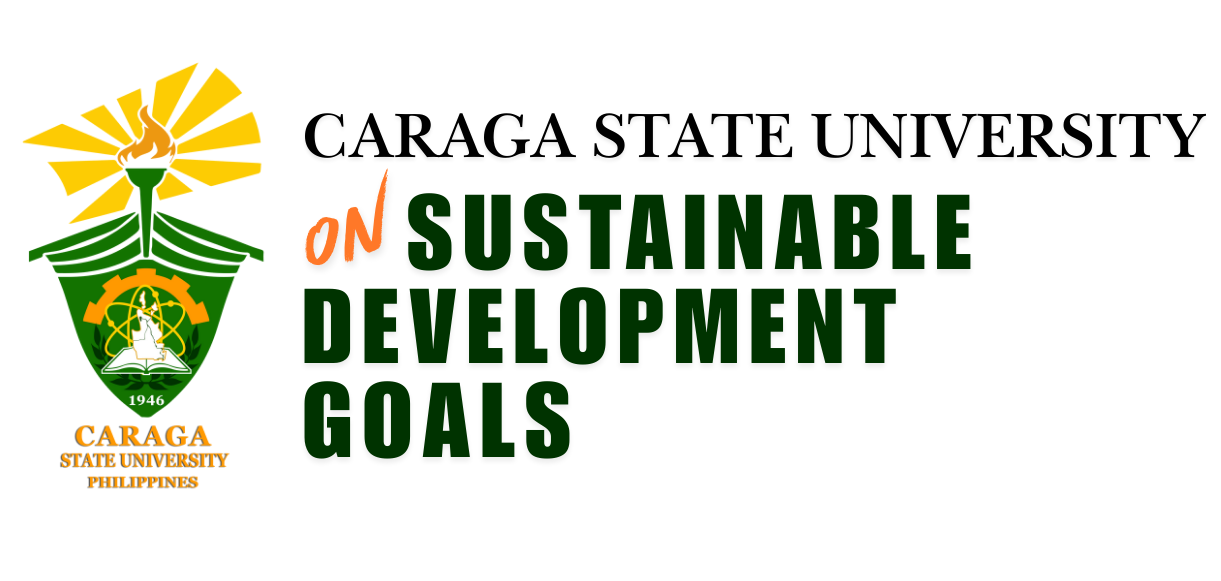Sustainable Development Goal (SDG) 4: Quality Education
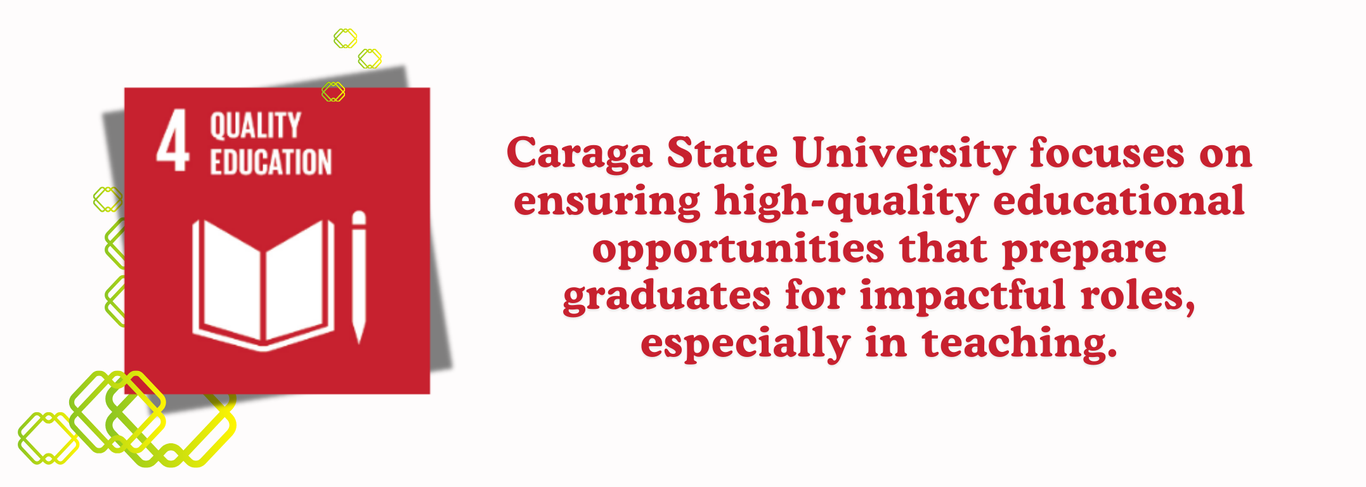
Overview
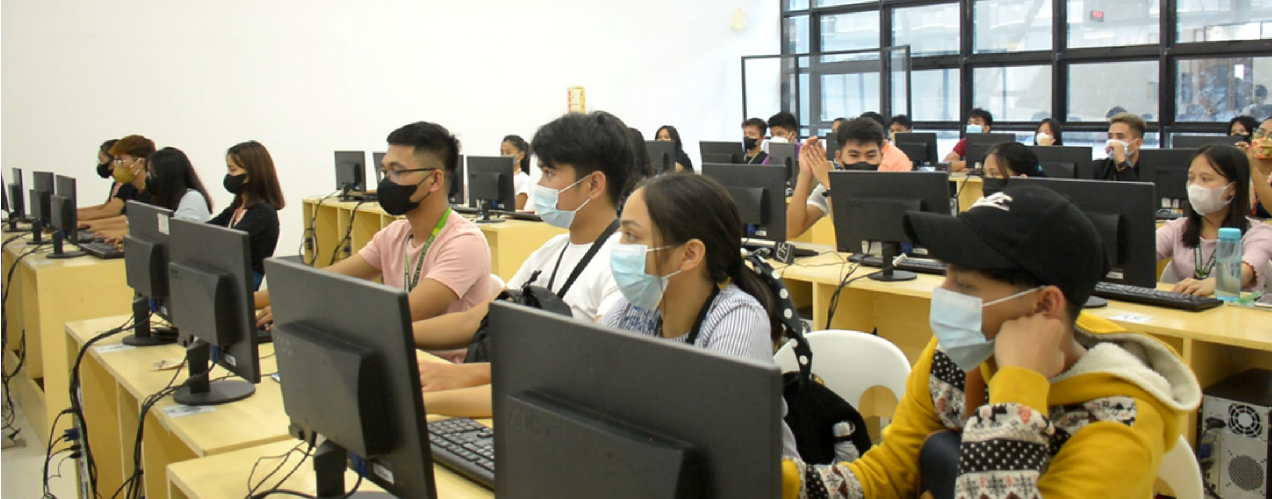
Under Sustainable Development Goal 4, CSU focuses on ensuring high-quality educational opportunities that prepare graduates for impactful roles, especially in teaching. Indicator 4.2 specifically measures the proportion of graduates with qualifications for teaching, which is a key factor in promoting lifelong learning and accessible education at all levels. At CSU’s main campus, 18.68% of graduates, or 312 out of 1,670, have obtained teaching qualifications, equipping them with the skills to educate and inspire future generations.
These graduates come from diverse programs, including Bachelor of Elementary Education (BEEd), Bachelor of Secondary Education (BSEd), Bachelor of Science in Mathematics (BSMATH), and Bachelor of Science in Applied Mathematics (BSAM). Notably, 88 of these graduates are qualified to teach at the primary school level, highlighting CSU’s contributions to filling critical teaching roles in foundational education.
| Program | Number of Graduates with Teaching Qualification |
| BEEd | 88 |
| BSEd | 175 |
| BSMATH | 35 |
| BSAM | 14 |
| 312 |
Through these programs, CSU is advancing the availability of qualified teachers, directly supporting SDG 4.2 and CSU’s mission to enhance the quality and accessibility of education in the region.
Sources:
https://drive.google.com/file/d/1nI02AiHxL46f0dh8a5VdfAkyuzu8lHvp/view?usp=sharing
https://drive.google.com/file/d/1LVGlL-oHUixJOnhoVbYYhY64y47H3Ej3/view?usp=sharing
4.3 Lifelong learning measures
4.3.1 Public resources
Caraga State University (CSU) actively supports SDG 4, particularly Metric 4.3, by promoting lifelong learning through free and accessible public educational resources. CSU leverages various digital platforms, including social media, blogging sites, and video streaming channels like YouTube, to extend educational content beyond the university’s physical classrooms and student body, reaching learners within and outside the academic community.
Through social media platforms such as Facebook and Twitter, CSU shares content on topics ranging from academic lectures to community-based educational initiatives, making it easy for individuals outside the university to access up-to-date information, educational materials, and university events. Blogs hosted by CSU faculty and departments provide insights into specialized fields, practical advice, and research highlights that help individuals deepen their knowledge in specific subjects. Additionally, CSU’s YouTube channel features recorded lectures, tutorials, public lectures, and workshops, all free and accessible to the public. This allows community members, professionals, and anyone interested in learning to benefit from high-quality educational resources at no cost.
These initiatives demonstrate CSU’s commitment to creating inclusive learning opportunities, supporting the community’s continuous education needs, and expanding access to quality educational resources, regardless of an individual’s academic enrollment status. By fostering public access to knowledge, CSU upholds SDG 4’s principles of lifelong learning and ensures that education remains accessible, equitable, and empowering for all learners.
Resources:
https://sites.google.com/csucc.edu.ph/math-reviewer/gem-reviewer |
Free courses leading to certificate or award
Fostering Educational Equity: The Pre-University Intervention Program’s Impact on Underprivileged Students at CSU
The Pre-University Intervention Program (Pre-UIP) is a six-week program implemented by Caraga State University (CSU) to assist underprivileged applicants who did not meet the cut-off score for the CSU Admission Test (CSU-AT). The program provides academic support in three key subjects: Mathematics, English, and Values, aiming to improve students’ knowledge and skills. To be eligible for admission to their desired degree program, students must successfully pass all three subjects based on their performance during the intervention.
The Pre-UIP is overseen by the Office of the Vice President for Academic Affairs (OVPAA) and the Office of the Vice President for Student Affairs and Services (OVPSAS), with the goal of providing opportunities for students facing educational barriers.
An essential component of the program is the assessment and evaluation process, which measures participants’ progress and identifies areas of difficulty. On August 16, 2023, this event was conducted at the Kinaadman Conference Hall of Caraga State University. It was attended by LDIC Director Ms. Rachel B. Apdo, instructors from Mathematics, English, and Values, along with LDIC staff and OAS Director, Engr. Erwin N. Arlan.
The program included a collaborative exchange of teaching strategies and experiences among the instructors. Teachers specializing in English, Mathematics, and Values came together, especially to support those teaching Pre-UIP subjects for the first time. This exchange proved to be enriching, offering both challenges and valuable insights.
The final phase of the event focused on assessing and evaluating students’ class performance, which also involved finalizing the list of program passers. Director Rachel B. Apdo expressed heartfelt gratitude and deep appreciation to the faculty members for their unwavering dedication and commitment to the success of Pre-UIP for the academic year 2023-2024.
In 2023, the results of the Pre-UIP show that out of 439 students, 336 successfully completed the program and received free courses in Mathematics, English, and Values. These courses were designed to help participants improve their academic skills and prepare for their future degree programs. The intervention addressed gaps in knowledge and enhanced critical thinking, problem-solving, and communication skills in these essential areas. The strong participation rate reflects the program’s effectiveness in supporting students who faced academic challenges, providing them with the tools needed to succeed in higher education. As a result, these students are now better equipped to meet the requirements of their chosen degree programs at Caraga State University.
https://docs.google.com/spreadsheets/d/1iSleSEBEHvUDyXdO8LuvZBs9ratkuBO721TbyO0Qc14/edit?gid=0#gid=0
Free access to campus facilities and equipment
Caraga State University (CSU) champions SDG 4’s commitment to accessible, inclusive, and lifelong learning by making campus facilities and services available to both students and community members. This approach fosters a learning environment that extends CSU’s resources and spaces to the broader public, ensuring that educational, recreational, and entrepreneurial opportunities are widely accessible.
Key campus facilities include:
- CSU HERO Learning Commons – This vibrant learning hub serves as a venue for educational events open to the community. The Learning Commons supports seminars, workshops, and collaborative study sessions, providing an inclusive space where learners and non-learners alike can gather, access information, and build knowledge.
- Kinaadman Hall – Known for hosting a variety of educational events and meetings, Kinaadman Hall welcomes both CSU students and non-students to participate in academic and community gatherings. This facility fosters a shared space for discussions, knowledge exchange, and professional development events that support the lifelong learning needs of the wider community.
- NAVIGATU, the DOST TBI for University Startups – NAVIGATU serves as an innovation hub for CSU’s student entrepreneurs and a Technology Business Incubator (TBI) for local Micro, Small, and Medium Enterprises (MSMEs). This facility empowers entrepreneurs and startups with access to mentorship, networking, and resources to support business growth, promoting technopreneurship and innovation within the region.
- Reception Hall and Eco-Park – This serene space hosts inter-faith activities and cultural gatherings, making it a welcoming venue for spiritual reflection and community-building events. Open to all, the Reception Hall and Eco-Park reflect CSU’s commitment to fostering inclusive environments that support holistic learning and well-being.
- University Oval – A key site for sports and general outdoor events, the University Oval is accessible to both students and the public for fitness activities, sporting events, and large gatherings. It provides a space for healthy living, recreational activities, and community sports, promoting physical well-being and social cohesion.
By making these spaces available to non-students, CSU promotes community engagement and lifelong learning. The university’s open access to facilities not only serves students but also strengthens CSU’s partnerships with local communities, supporting sustainable development goals through inclusive education and community-based learning experiences.
CSU Hero Learning Commons
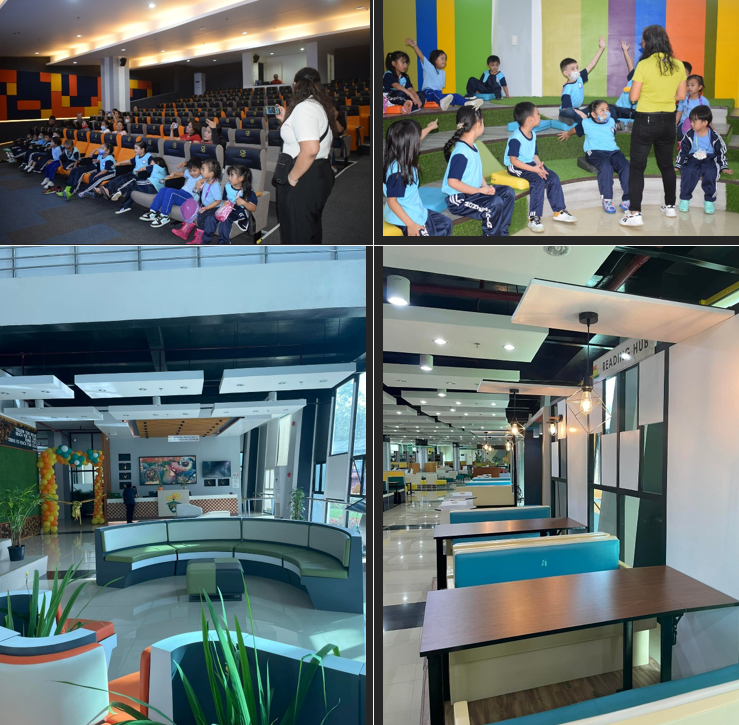
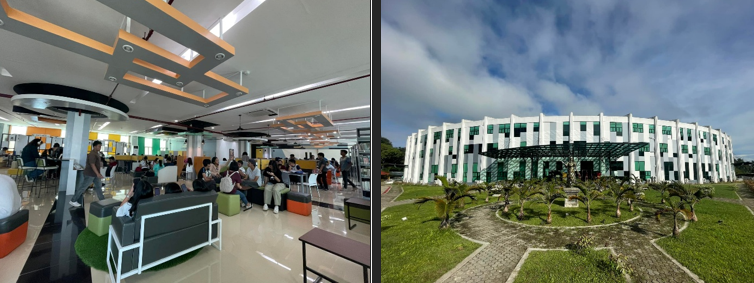
Kinaadman Hall
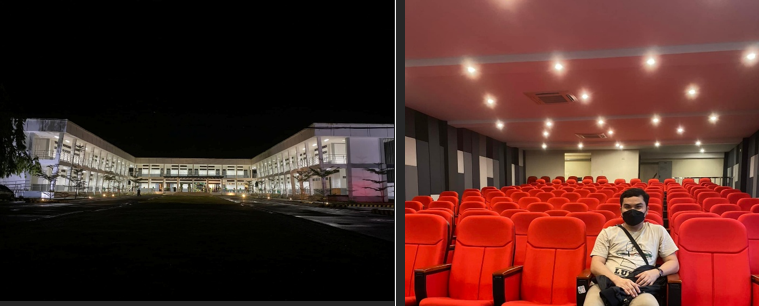
Navigatu
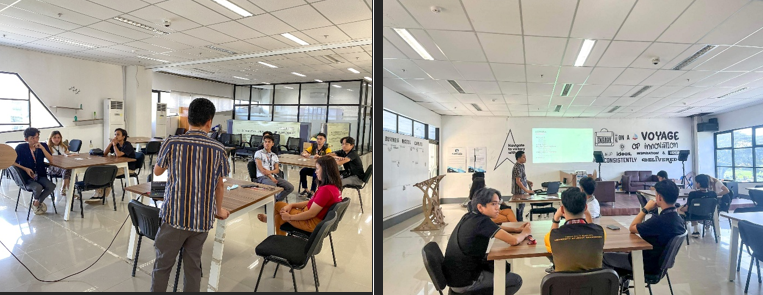
Eco-Park
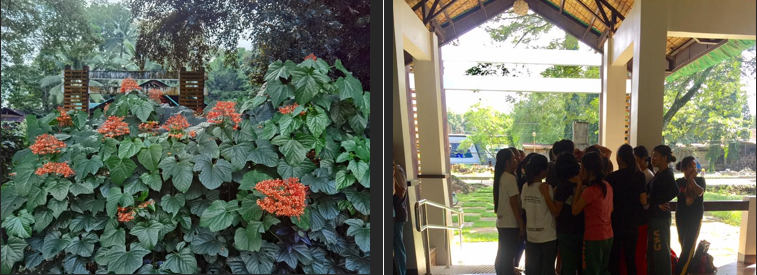
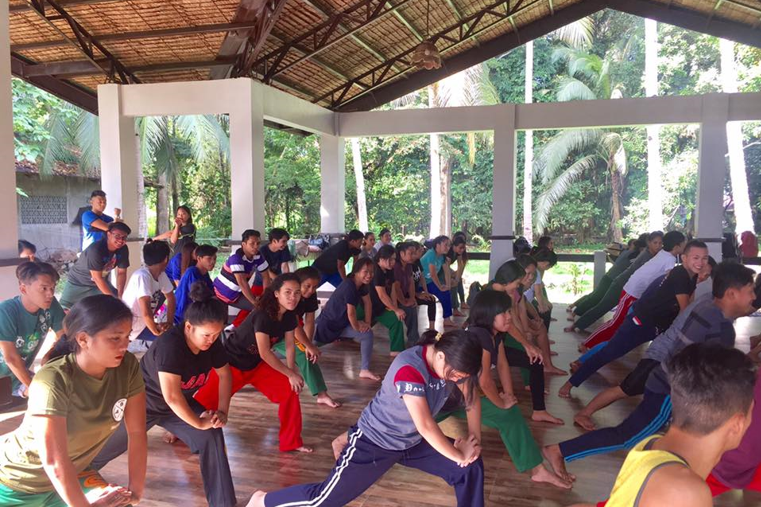
OVAL

Link 1, Link 2, Link 3, Link 4, Link 5
Free access to online resources
In alignment with SDG 4’s goal of providing inclusive and equitable quality education, Caraga State University (CSU) launched the Masao Learning Management System (MasaoLMS) in 2020, utilizing Moodle to create a comprehensive online learning platform that serves CSU students and extends to learners outside the university. The MasaoLMS offers flexible access to course content, assessments, interactive tools, and progress tracking features, supporting both asynchronous and synchronous learning.
To further broaden access, CSU has partnered with Google for Education, leveraging a suite of Google-powered resources such as Google Sites and YouTube to make lectures, educational videos, and other learning materials freely accessible. This partnership with Google for Education enhances CSU’s ability to provide quality educational content to a diverse audience, promoting inclusive and continuous learning opportunities beyond the campus.
The MasaoLMS is managed by the Virtual Learning Research Center (VLRC) under Dr. Junrie B. Matias and the Management Information System (MIS) led by Prof. Maria Besa Joy M. Ortuyo, who ensure that the platform remains reliable, secure, and user-friendly. The platform’s policies and protections, overseen by a committee led by Dr. Luisito I. Tabada, emphasize user rights, data privacy, academic integrity, and intellectual property safeguards to create a supportive online environment.
During the pandemic, MasaoLMS became indispensable, enabling faculty and students to adapt to remote learning with ease. The partnership with Google for Education has further strengthened CSU’s capacity to provide accessible, flexible learning resources that contribute to the university’s SDG 4 commitment to quality education and lifelong learning. By extending educational content through MasaoLMS, Google Sites, and YouTube, CSU demonstrates its dedication to equitable learning and continuous education for all.
URL: https://masaolms.carsu.edu.ph/
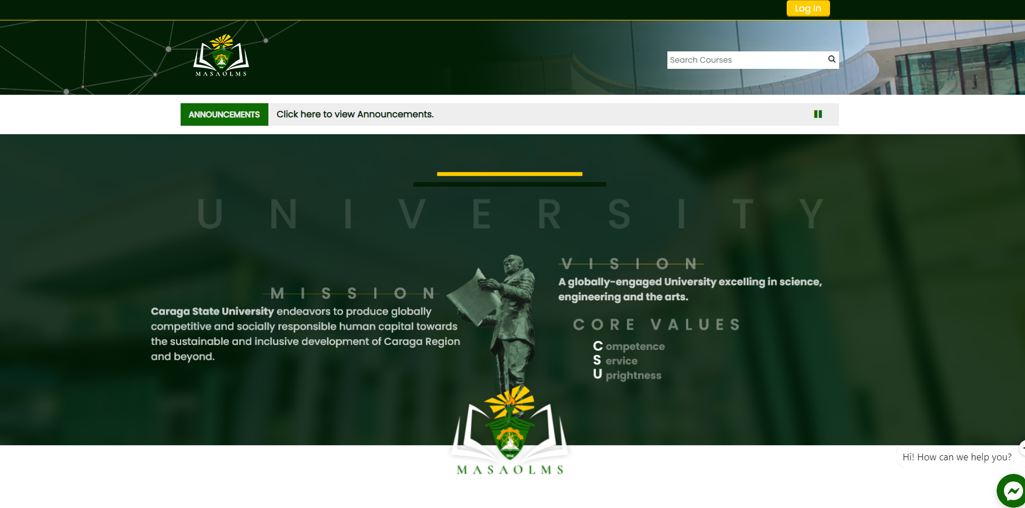
4.3.2 Public events (lifelong learning)
Caraga State University (CSU) demonstrates a strong commitment to SDG 4: Quality Education by hosting a diverse range of educational events that extend learning opportunities to the general public. These lifelong learning initiatives are hosted and co-hosted in collaboration with various academic, governmental, and community-based organizations, supporting knowledge exchange and capacity-building across sectors. Key events include:
- Capability Training for Junior High and Senior High School Teachers on Action Research (April 1, 2022 – May 31, 2023)
CSU provided specialized training for Junior and Senior High School teachers from the Municipality of Sibagat, enhancing their skills in conducting action research to support student learning and outcomes.
https://drive.google.com/drive/folders/1SGqjD6lQpaEX40kXrAEECupMRx3o0Iry?usp=share_link
- Capacitating Local and Indigenous Communities in Pagatpatan on Localized Herbal Medicine Formulation (AY 2022 – AY 2025)
In collaboration with local and Indigenous communities in Pagatpatan, CSU embarked on a multi-year initiative to educate participants on formulating herbal medicines, supporting traditional knowledge preservation and healthcare within these communities.
https://drive.google.com/drive/folders/14Qs5ylFHIn5RfzBwQn3GXAgsNbzDQ93V?usp=share_link
- Training on Policy Brief Development (January 10-13, 2023)
This event brought together participants from universities and government agencies, offering them training in developing effective policy briefs to bridge research and actionable policy-making.
https://docs.google.com/document/d/1-qtFj2090cKxtLEtIYfL3c3R6e-xgoZ_/edit
- Student-Faculty Mathematical and Statistical Webinar Conference 2023 (January 30-31, 2023)
CSU hosted a two-day conference with researchers from other institutions, providing a platform for knowledge sharing and skill development in mathematics and statistics for students and faculty alike.
https://docs.google.com/document/d/18KYE3NbubRZyHT6RHumkVUybd1rNvR3X/edit
- 2023 LIKHA Summit (SciTech4Dev Forum) (November 20-24, 2023)
This multi-day summit gathered stakeholders from academia, industry, and local government networks to discuss advancements in science, technology, and development, fostering cross-sectoral partnerships and knowledge-sharing.
https://docs.google.com/document/d/1d03IO7kjb_EwGR453rddpFSCcYZmujDG/edit
https://vprie.carsu.edu.ph/likha-summit-scitech4dev-2023
- DOST RD-Lead Training on Crafting Policy Briefs and Research Dissemination (January 10-12, 2023)
In collaboration with the DOST and the National Research Council of the Philippines (NRCP), CSU organized a workshop to empower participants, including LGU representatives, in crafting policy briefs and effectively disseminating research findings.
- 12th PARSSU International Research Conference-Workshop (May 22, 23, 25 & 26, 2023)
A Charged event co-hosted by the PARSSU Mindanao Chapter, this international workshop facilitated research collaboration and shared innovative ideas among participants from academia and other agencies.
https://www.facebook.com/profile.php?id=100081622267433
- 25th Philippine Mathematical Olympiad (January 14, 2023)
CSU hosted mathletes from nine schools across Caraga, providing a competitive platform to foster young talent and enthusiasm in mathematics.
https://www.facebook.com/profile.php?id=100081622267433
- 2nd International Computing and Information Sciences Conference (CISCON) (June 8-9, 2023)
This conference gathered innovators and collaborators worldwide, supporting global dialogue and exploration of advancements in computing and information sciences.
These public educational events not only provide CSU students and faculty with learning opportunities but also extend these benefits to community members, teachers, government personnel, and international participants, reinforcing CSU’s commitment to lifelong learning and public engagement in support of SDG 4.
4.3.3 Vocational training events (lifelong learning)
𝐂𝐅𝐈𝐂 𝐜𝐨𝐧𝐝𝐮𝐜𝐭𝐞𝐝 𝐭𝐫𝐚𝐢𝐧𝐢𝐧𝐠 𝐨𝐧 𝐫𝐢𝐜𝐞-𝐛𝐚𝐬𝐞𝐝 𝐩𝐫𝐨𝐝𝐮𝐜𝐭𝐬 𝐩𝐫𝐨𝐜𝐞𝐬𝐬𝐢𝐧𝐠
To support SDG 4 on Vocational Training and Education, the Caraga Food Innovation Center (CFIC) conducted a hands-on training session on rice-based processing on August 31, 2023. Organized by the Department of Trade and Industry (DTI) Agusan del Norte in collaboration with the Comprehensive Agrarian Reform Program (CARP), the training aimed to empower the Rosario Samahang Nayon MPC, a cooperative of local farmers and DTI CARP beneficiaries, by enhancing their knowledge and technical skills in food processing.
Held in Barangay Rosario, Las Nieves, Agusan del Norte, the workshop addressed both economic and educational needs of the community. CFIC guided participants through the process of developing new rice-based products, with the dual objectives of boosting the cooperative’s income streams and creating job opportunities, particularly for women within the group. DTI-Agusan del Norte, represented by Mr. Mikie D. Villanueva, supported the training by providing raw materials and essential utensils, ensuring that participants had the resources needed for a productive learning experience.
The training was divided into two sections. The first session included an informative presentation on CFIC’s services and the importance of food safety, led by Ms. Bethel Jane N. Iligan, an MS Graduate Fellow of CFIC. She covered essential food safety protocols and introduced participants to various rice types and their characteristics, providing a foundation for the hands-on portion of the training.
In the second, hands-on session, participants learned to process rice into various products, including rice chips, puffed rice, and mochi. Working in small groups, each team took on different stages of the production process. Despite limited resources, participants demonstrated eagerness and dedication, even utilizing sun-drying techniques when necessary. This interactive training allowed cooperative members to build confidence and proficiency in creating rice-based products.
The program successfully fostered a learning environment where participants could enhance their food processing skills, with strong support from DTI-Agusan del Norte CARP and CFIC. The cooperative’s rice-based products will soon be introduced at an upcoming trade event, where market reception will be gauged with the full support of the agency. This initiative exemplifies Caraga State University’s (CSU) commitment to lifelong learning and vocational training, equipping local communities with sustainable skills that drive economic resilience and contribute to achieving SDG 4 goals for quality education.
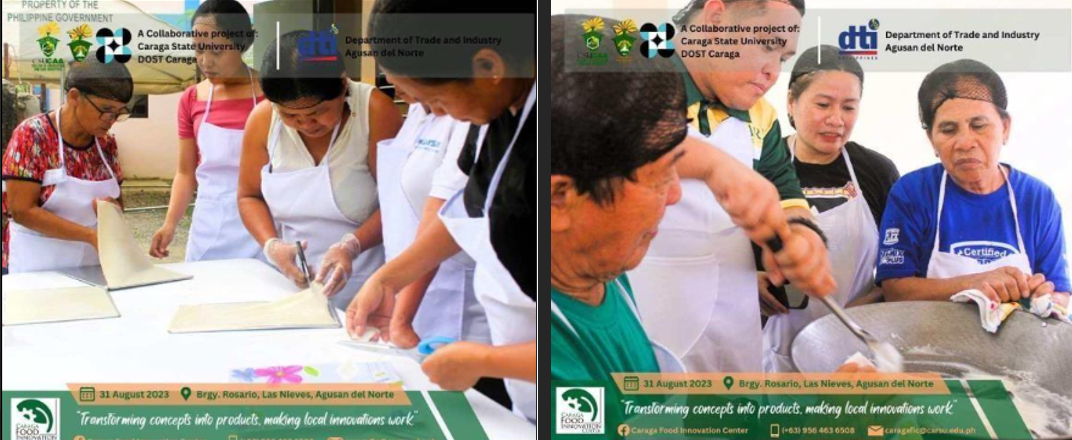
Another activity conducted by the Caraga Food Innovation Center (CFIC) supports SDG 4: Quality Education by providing vocational training and executive education programs accessible to the general public. This initiative specifically aims to enhance local industries and empower small enterprises. A notable example of this effort is the COCOdev marketing assistance and support service initiative, organized by the Department of Trade and Industry (DTI) Agusan del Norte in collaboration with Caraga State University’s Caraga Food Innovation Center.
In October 2024, CSU and DTI-Agusan del Norte hosted a two-day COCOdev event to empower coconut-based Micro, Small, and Medium-Sized Enterprises (MSMEs) in Agusan del Norte and Butuan City. This program aimed to improve product quality, taste, and branding to increase the competitiveness of local MSMEs. During the event, 20 participants from 7 MSMEs and farmer cooperatives took part in intensive product clinic sessions led by expert consultants from CSU and an experienced product graphic and branding designer. The sessions focused on enhancing 21 coconut-based products, with guidance on quality improvement, packaging, and branding strategies.
The participating organizations included:
- Bascaa Coconut Farmers Organization
- Butuan Coconut Products Inc.
- Libas Farmers Multipurpose Cooperative
- MNL De Bugabus – Leonora Curayag-Imelda Mar Farmers Association
- CountryFields Agri
- Culit Multipurpose Cooperative
- Jagupit Coconut Farmers Association
Key outcomes of the COCOdev initiative are expected to include enhanced product packaging and labeling, comprehensive product improvement reports, and strategic action plans tailored to each MSME. These improved coconut products will be showcased at the PISTA Trade Fair at SM Butuan from November 16-30, 2024, providing MSMEs with a valuable platform to connect with potential buyers and consumers.
This initiative underscores CSU’s commitment to promoting lifelong learning and practical skills development beyond traditional academic courses, fostering local economic growth and supporting the sustainable development of the regional coconut industry. Through vocational training like COCOdev, CSU broadens its educational impact, contributing to sustainable development and community resilience in alignment with SDG 4.

https://www.facebook.com/DTI.AgusandelNorte
4.3.4 Education Outreach Activities Beyond Campus
Caraga State University (CSU) has actively engaged in several educational outreach initiatives beyond its campus, extending its impact to local schools and communities. These activities not only enhance the learning experiences of participants but also foster a sense of community involvement and support. Below are some of the key outreach activities conducted:
- Kids’ Day Out at Ahon Community Care Center, Barangay Pigdaulan
The Kids’ Day Out event at the Ahon Community Care Center in Barangay Pigdaulan is designed to provide children with a fun, educational experience that promotes personal growth. The event features interactive games, educational workshops, and creative activities that aim to develop social skills, creativity, and teamwork. It offers children a safe and nurturing environment to learn, fostering a sense of belonging and inclusion within the community. https://tinyurl.com/jycckxz7
- Peace Camp 2024 at Sibagat National High School of Home Industries
The Peace Camp 2024 promotes peacebuilding and conflict resolution among students. Held at Sibagat National High School of Home Industries, the camp focuses on raising awareness about the importance of peace, understanding cultural diversity, and fostering social harmony. The activities include team-building exercises, discussions on conflict resolution, and workshops that guide participants in creating peaceful solutions to societal issues, promoting respect and tolerance within the community. https://docs.google.com/document/d/1fbzhu0FbCF818KoehghGLLYRCRHnbxEg/edit?usp=drive_web&ouid=113899834743337561096&rtpof=true
- Gender and Development Seminar
The Gender and Development Seminar seeks to raise awareness about gender equality, women’s rights, and the importance of inclusivity in all aspects of society. Through discussions on gender stereotypes, roles, and opportunities, the seminar encourages participants to challenge and break societal barriers. Featuring expert speakers, interactive workshops, and activities, the seminar empowers individuals to advocate for gender equity and contribute to building a more inclusive society. - Math and Science Camp at Sibagat, Agusan del Sur
The Math and Science Camp is an educational initiative aimed at sparking curiosity and developing a passion for STEM (Science, Technology, Engineering, and Mathematics). Held in Sibagat, Agusan del Sur, the camp provides hands-on activities, experiments, and problem-solving challenges that engage participants in the fields of mathematics and science. The camp encourages participants to explore STEM subjects in an interactive setting, building confidence and skills in scientific inquiry and mathematical reasoning. https://www.facebook.com/photo/?fbid=995606509247180&set=pcb.995609525913545
- Literacy and Numeracy Program
The Literacy and Numeracy Program is dedicated to improving the fundamental skills of reading, writing, and mathematics for both children and adults in underserved communities. This initiative provides targeted support to participants through tutoring sessions and workshops aimed at enhancing literacy and numeracy abilities. The program equips individuals with essential skills that serve as the foundation for academic and personal success, fostering confidence and lifelong learning. https://drive.google.com/drive/folders/11BApIedO7LGW4VRYCHYqAJhk5O9nPWwa?usp=sharing
https://drive.google.com/drive/folders/1VruGIglrYjeWb8tk9DLhtZYU6BjhK-Sf?usp=sharing
- First Aid, Fire, and Earthquake Seminar and Drills
This comprehensive seminar and drill program aims to prepare individuals for emergency situations by equipping them with life-saving skills. Participants learn how to perform basic first aid, respond to fire emergencies, and react appropriately during an earthquake. The session combines theoretical knowledge with practical drills, ensuring that participants are well-prepared to handle emergencies efficiently and safely, potentially saving lives and reducing harm. https://drive.google.com/drive/folders/1jpE5-Y0IAVDtLS8sM4OgHB9RHKseO7XG?usp=sharing
- Brigada Eskwela Volunteers
Brigada Eskwela is a national initiative that encourages the community to participate in preparing public schools for the start of the school year. CSU volunteers, including faculty, students, and community members, come together to clean, repair, and maintain school facilities. By fostering a spirit of collaboration and community responsibility, the volunteers contribute to creating a conducive learning environment, ensuring that schools are ready for students and supporting the education sector. https://drive.google.com/drive/folders/1Rfg30flc2t3FXtGlFwf2X9M3CreAsDiT?usp=sharing
- Training-Workshop on Counseling and Social Work for Humanities and Social Sciences Students
This workshop is aimed at equipping students in the Humanities and Social Sciences fields with the necessary skills and knowledge to address social issues and support individuals in need. The training focuses on counseling techniques, including listening skills, empathy, and ethical practices, while also covering social work principles. Students gain practical experience in addressing emotional, social, and psychological challenges, preparing them to become effective social workers and counselors in their communities. https://drive.google.com/file/d/1MIho9WWExQ4pH4ZwCrBmzGH_guMglSE0/view?usp=sharing
These outreach initiatives reflect CSU’s commitment to extending quality education, fostering community development, and empowering individuals. By integrating these activities into its programs, CSU plays a significant role in supporting local communities, promoting social progress, and advancing inclusive development in alignment with SDG 4: Quality Education.
4.3.5 Lifelong learning access policy
A policy that ensures that access to these activities is accessible to all, regardless of ethnicity, religion, disability immigration status or gender.
CSU’s policy, as outlined in the Student Handbook and disseminated through the university’s website, is designed to make education and skill-building activities accessible to all segments of society, reflecting the core principles of SDG 4.3.5. By posting the handbook online, CSU ensures that information is easily accessible to a wide audience, contributing to transparency and providing equitable access to the university’s offerings, especially for those who may not be able to physically visit the campus or access traditional forms of communication.
The university’s commitment to achieving the regional and national development goals through the core areas of Instruction, Research, Extension, and Production ties into SDG 4.3.5 in several keyways:
- Equity and Access: CSU’s outreach activities, such as the Kids’ Day Out, Peace Camp, and Math and Science Camp, are designed to be inclusive, offering opportunities to a diverse range of participants, including children, youth, and adults from various ethnic, religious, and socio-economic backgrounds. These activities are structured to promote equitable access to education and skills development, ensuring that individuals from all walks of life can benefit from the resources and training offered by CSU.
- Instruction and Lifelong Learning: The Training-Workshop on Counseling and Social Work for Humanities and Social Sciences students and other educational programs ensure that participants are equipped with the skills needed for their personal and professional development, regardless of their background. These programs aim to promote lifelong learning by providing knowledge and skills that students and community members can use throughout their lives, thereby aligning with SDG 4.3.5’s goal of fostering continuous education opportunities.
- Diversity and Inclusion: CSU’s policy ensures that the educational and outreach activities are accessible to all, regardless of ethnicity, religion, disability, immigration status, or gender, which is in line with the principle of inclusion stated in SDG 4.3.5. For instance, in the Gender and Development Seminar, CSU emphasizes gender inclusivity and equality, offering education on gender-related issues and promoting equal opportunities for all, regardless of gender.
- Research and Impact: The outreach programs also contribute to CSU’s research goals by providing data on community needs and impact, allowing the university to improve the accessibility and relevance of future programs. Additionally, through its extension programs like Brigada Eskwela and First Aid, Fire, and Earthquake Seminar, CSU empowers community members with essential skills while simultaneously advancing its research initiatives to address specific community challenges and improve educational outcomes.
- Discipline, Teamwork, and Learning to Learn: CSU’s policies and activities are grounded in fostering a sense of discipline and teamwork, as seen in collaborative events like the Brigada Eskwela and Peace Camp. These programs not only teach specific skills but also encourage participants to engage in collaborative problem-solving and continuous learning. This aligns with SDG 4.3.5’s emphasis on creating lifelong learners who are equipped to adapt to evolving societal needs.
Link:
https://www.carsu.edu.ph/sites/default/files/downloadables/Student%20Handbook%20Final%20Revision.pdf
4.4 Proportion of first-generation students
4.4.1 Proportion of first-generation students
The data on first-generation students (55.8% of 1133 students) and the total number of students starting a degree (4427) highlights significant progress in increasing access to higher education, particularly for underserved groups. This aligns with SDG 4.4, which emphasizes skills development for decent work and entrepreneurship. Insights from this data include:
- Increased Access: A large proportion of first-generation students reflects improved access to education for marginalized communities, supporting social mobility and reducing inequality.
- Skills Development: These students gain critical skills, enhancing their employability and contributing to the economy through both employment and entrepreneurship.
- Social Mobility: Higher education for first-generation students helps break the cycle of poverty, fostering empowerment and economic growth in communities.
- Institutional Growth: The university’s focus on inclusivity enhances its reputation and drives demand for its programs, further supporting regional and national development.
Finally, the impact of enrolling 55.8% first-generation students in degree programs is far-reaching. It contributes to economic mobility, workforce development, and societal equity, while supporting the overarching goals of SDG 4.4. Equipped with the necessary education and skills, these students will have a profound impact on their own lives, their communities, and the economy, creating a more inclusive, innovative, and equitable society. Through their success, the institution helps bridge the gap for disadvantaged populations, fostering long-term prosperity and resilience.
Building Partnerships for the Sustainable Development Goals
Caraga State University (CSU) has been actively building partnerships with a diverse range of organizations, both local and international, reflecting its commitment to advancing research, community development, and educational initiatives. The university’s partnerships in 2023, documented in a detailed list, emphasize collaborative engagements in areas spanning community welfare, technological development, agriculture, and environmental sustainability. Each Memorandum of Agreement (MOA) and Memorandum of Understanding (MOU) demonstrates CSU’s strategic alignment with government agencies, private sector partners, and international academic institutions to address regional and global challenges.
One of CSU’s prominent partnerships includes its collaboration with local government units (LGUs) and community organizations to foster development initiatives directly benefiting local communities. For instance, the MOA with Brgy. La Januza and the Gawad Kalinga Community Development Foundation represents a grassroots approach to social upliftment, aiming to address housing and community needs in Surigao del Norte. This partnership underlines CSU’s commitment to sustainable community development, a goal further extended through a similar partnership with Brgy. Abilan and the Gawad Kalinga Abilan Village in Butuan City. These initiatives highlight the university’s dedication to directly supporting marginalized communities, emphasizing its role as a vital contributor to local socio-economic growth.
Another significant sector that CSU focuses on through partnerships is health. The university’s MOA with MJ Santos Hospital underscores CSU’s contribution to healthcare advancements and potentially collaborative research in the health sciences. This partnership not only opens pathways for student internships but also aligns with CSU’s broader objective of integrating scientific research and healthcare services to improve the quality of life within the region.
CSU also prioritizes research and innovation in science and technology through collaborations with notable organizations and institutions. For example, the MOA with Bulacan State University and Huawei Technologies showcases CSU’s commitment to technological innovation. Huawei’s involvement potentially brings cutting-edge technologies and resources that can elevate CSU’s capacity in digital and technological education, ensuring that students and faculty members gain exposure to advanced tools and methodologies. This partnership is particularly significant in preparing CSU’s stakeholders for the demands of a rapidly evolving technological landscape.
Agricultural development, a crucial industry for the Caraga region, is well represented in CSU’s partnership portfolio. The university’s engagements with the Department of Agriculture (DA) and the Bureau of Agricultural Engineering aim to support research and development in sustainable agriculture. These collaborations potentially cover innovations in biotechnology and farm mechanization, promoting modern, efficient farming practices that could be transformative for the region’s agriculture-dependent economy. The university’s additional partnership with DA for the ‘Farm Vista’ project further solidifies its role as an academic institution that integrates agricultural expertise and regional needs, particularly in terms of sustainable farming.
Environmental sustainability is also a central theme in CSU’s partnerships. Collaborations with entities like the Philippine Institute of Volcanology and Seismology (PHIVOLCS) are vital for enhancing CSU’s research on disaster preparedness and environmental conservation. Similarly, the university’s alliance with DENR Region 13 highlights CSU’s commitment to environmental protection, enabling initiatives that can help mitigate the impacts of climate change, particularly relevant for the Philippines’ disaster-prone regions.
International partnerships play a prominent role in CSU’s global engagement strategy. Collaborations with institutions such as Hokkaido University, UP Diliman’s National Institute of Physics, and Stavanger University signify CSU’s goal to expand its research horizons and academic influence beyond the Philippines. Such international partnerships facilitate knowledge exchange, collaborative research, and even student and faculty mobility, enriching the university’s academic community and reinforcing its international standing. The MOU with Silla University in South Korea represents another valuable cross-border educational exchange that could bring significant benefits to CSU’s educational programs.
Moreover, CSU has also extended its partnerships into the realm of policy and governance. An MOU with NEDA-Caraga suggests that CSU is contributing to regional policy planning, potentially providing research-based insights that support sustainable development initiatives. This partnership reflects CSU’s increasing involvement in policymaking processes, ensuring that the university’s expertise in research and innovation actively informs the region’s developmental strategies.
Caraga State University’s diverse and strategic partnerships underscore its role as a key driver of regional development and innovation. By actively engaging with various sectors, CSU not only enhances its academic and research capabilities but also positions itself as a critical agent of positive change, addressing both local and global challenges. These partnerships showcase CSU’s commitment to creating a sustainable and prosperous future for the Caraga region, establishing a framework where education, research, and community development coalesce to make a lasting impact. Through these collaborations, CSU continues to empower its students, faculty, and communities, aligning with its mission of fostering a dynamic and inclusive environment for learning and development.
The date received from the Office of the President | OP Reference Slip Number | Document |
09/28/2023 | 2023-2-3494 | Memorandum of Agreement between CSU, Brgy. La Januza, GL, SDN, and Gawad Kalinga Community Dev’t Foundation, Inc. |
09/28/2023 | 2023-2-3494 | Memorandum of Agreement between CSU, LGU of Sibagat, ADS, and ECOWEB |
09/29/2023 | 2023-1-5883 | Memorandum of Agreement between CSU and MJ Santos Hospital |
09/29/2023 | 2023-1-5883 | Memorandum of Agreement between CSU, Brgy. Abilan, Butuan City, and Gawad Kalinga – Abilan Village |
09/29/2023 | 2023-1-5890 | Memorandum of Agreement between CSU, DA, and DOST |
09/28/2023 | 2023-1-5872 | Memorandum of Agreement between CSU, SumMo, and Apex Mining Co. Inc., |
10/09/2023 | 2023-1-6057 | Memorandum of Agreement between CSU, Bulacan State University, and Huawei Technologies |
10/10/2023 | 2023-1-6156 | Memorandum of Understanding between CSU and Project Caraga Group, Inc. |
10/18/2023 | 2023-1-6456 | Memorandum of Agreement between CSU and MSU-IIT NMPC |
10/19/2023 | 2023-1-6498/1-4599 | Memorandum of Agreement between CSU and LGU – Alegria, SDN |
10/24/2023 | 2023-1-6617 | Memorandum of Understanding between CSU and USEP |
10/24/2023 | 2023-1-6617 | Memorandum of Agreement between CSU and PHIVOLCS |
10/26/2023 | 2023-2-3922 | Memorandum of Agreement between CSU and LANDBANK Countryside Development Foundation |
11/03/2023 | 2023-1-6733 | Memorandum of Agreement between CSU and Department of Agriculture – Biotech |
11/06/2023 | 2023-2-4018 | Memorandum of Agreement between CSU, DOST, BLGU Lawan-Lawan, and SAFABAI |
11/08/2023 | 2023-1-6886 | Memorandum of Agreement between CSU and DENR RO 13 |
